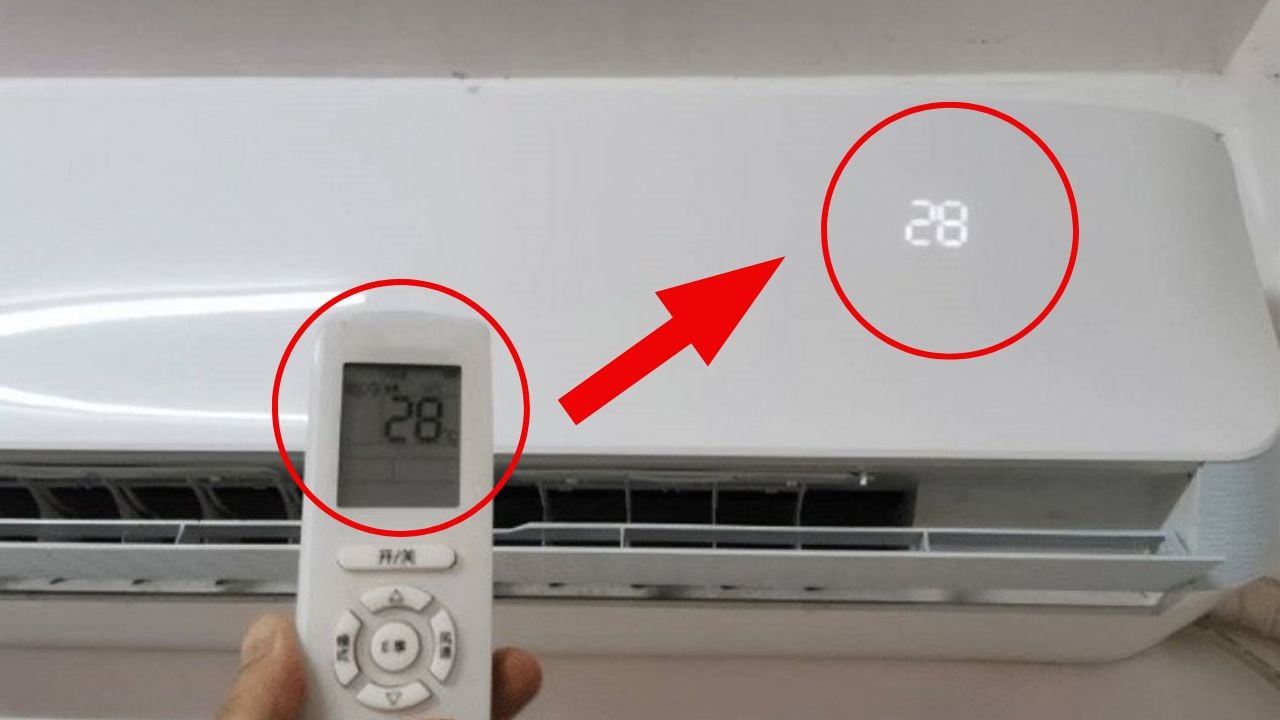
Running Your Air Conditioner at 28–29°C at Night to Save Electricity Is a Mistake: Here’s the Correct Temperature

Many people have developed the habit of setting their air conditioners to 28–29°C at night, believing it helps save electricity and is better for their health. But is this really true? Let’s take a closer look at what science and experts have to say.
The Benefits of Sleeping with the Air Conditioner On
In developed countries, air conditioning has become an essential part of modern living, providing comfort and improving sleep quality. Using an air conditioner helps you fall asleep faster, enjoy deeper rest, and recover better after a long, exhausting day.
When the room temperature is balanced with your body’s natural comfort range, you tend to sleep more soundly. However, as you enter deep sleep, your body temperature naturally drops. That’s why it’s important to use a light blanket or duvet to prevent getting too cold at night.
Interestingly, sleeping in a cool environment can even support weight management. Research has shown that cooler temperatures help boost metabolism and promote the conversion of white fat (which stores energy) into brown fat (which burns energy).
Moreover, studies indicate that sleeping under an air-conditioned environment with moderate cooling can aid detoxification, tissue repair, and even help alleviate symptoms of chronic pain or neurological disorders. It also improves mental well-being, particularly for those struggling with stress or mild depression.
Does Setting the AC to 28–29°C Actually Save Power?
According to HVAC experts, an air conditioner works most efficiently when the outdoor temperature is below 48°C and the indoor temperature is at least 19°C or higher. To optimize energy use, your indoor temperature should ideally be 6–10°C lower than the outdoor temperature.
This means that if it’s 40°C outside, setting your AC to around 30°C will keep your room cool while conserving electricity. However, when it’s 30–35°C outdoors, the ideal indoor range should be 25–28°C. Setting your AC too high, such as at 30°C, may cause the outdoor compressor to switch on and off repeatedly, which actually consumes more electricity due to frequent restarts.
In contrast, setting the temperature too low (for example, 24–25°C) forces the compressor to run continuously at maximum power, which leads to higher electricity bills and increased wear on the system.
To save energy and protect your health, you should activate the “Sleep Mode” feature on your air conditioner at night. This function automatically increases the temperature by 1°C after 30–60 minutes, and then again after another hour or two. This gradual adjustment prevents you from feeling too cold in the middle of the night and helps the system run more efficiently.
For example, you can set your AC to 26°C before going to bed and turn on sleep mode. After one hour, the temperature will automatically rise to 27°C, then to 28°C after two hours—perfectly adapting to your body’s cooling rhythm during deep sleep. This not only ensures comfortable rest but can reduce electricity consumption by up to 15–20% over time.
Additional Tips for Using Air Conditioning Safely and Efficiently
-
For children and the elderly: Their immune systems are more sensitive, so limit air conditioner use to about 2–3 hours at a time. Let the room rest for 30 minutes before turning it on again, and never allow cold air to blow directly onto their bodies.
-
After outdoor activities: When returning from hot weather, wait at least 5 minutes before entering an air-conditioned room to allow your body to adjust. Likewise, turn off the AC about 20–30 minutes before leaving to reduce the shock from temperature changes.
-
Regular maintenance: Clean the filters and service the AC periodically to prevent mold and bacteria buildup. A well-maintained system cools more efficiently and lasts longer.
-
Ensure ventilation: Open windows occasionally to allow fresh air circulation, preventing the room from becoming too dry or stuffy.
-
Healthy lifestyle habits: Stay hydrated, eat plenty of fruits and vegetables, and maintain a balanced diet to strengthen your immune system and reduce the risk of catching a cold from prolonged AC exposure.
Final Thoughts
Using an air conditioner wisely can improve your quality of life, sleep, and overall health. The key is balance: avoid setting the temperature too high or too low, and take advantage of modern energy-saving features. The ideal nighttime setting for most people is around 26°C with sleep mode enabled, rather than 28–29°C as commonly believed.
By following these recommendations, you’ll enjoy restful, comfortable sleep while keeping your electricity bills under control and protecting your long-term health.
News in the same category


How to Easily Unclog Stubborn Drains Without Calling a Plumber

Tips for Faster Hair Growth, Reduced Hair Loss, and Shiny Hair Using Beer Hair Wash

One Week After Trying This Trick, Ants, Roaches, and Mosquitoes Completely Disappeared from My Home

Drinking Coconut Water on an Empty Stomach for 7 Days: One Simple Habit, Ten Amazing Benefits

Old Mattress Smelling Musty and Dirty? Sprinkle This on the Surface — It’ll Be Clean Like New Without Washing!

How to make fragrant and nutritious passion fruit peel jam

The refrigerator gasket is moldy, use this to clean it, it will be clean in just 5 minutes

How to make spicy and sour pickled cabbage to eat during Tet

Winter drink lemon honey ginger water, body 5 special benefits

Tet candies have desiccant packets, remember to keep them because they are extremely useful.

The old farmer reveals the differences between 2 types of cabbage and 3 things to note when buying to avoid confusion and choose delicious, safe types.

6 types of 'natural miracle' vegetables help the stomach get healthy every day, eat regularly for 1 week and you will see the difference

Shrimp seller tips: How to distinguish farmed shrimp from wild shrimp in just a few seconds of observation

Just do these 4 things every morning, your intestines will "clean" themselves, toxins and excess fat will disappear without medication

A type of tuber grown in the bedroom, absorbs all bacteria to help the whole family stay healthy.

How to make fried red tilapia with minced mango and sweet and sour fish sauce, rich in Western flavor

Have a lot of mosquitoes in your house? Plant this flower and place it on your windowsill, all the mosquitoes will disappear.
News Post

Carrot, Ginger Juice Recipe Drink this regularly and you'll notice incredible changes in your body: 5 amazing benefits of this beverage 👇

Turning Point USA Announces Rival Super Bowl Halftime Show 'Anything in English' Option

Strictly star Ellie Goldstein addresses exit as she announces she and Vito will keep training together ‘until the final’

How to Wash and Condition Hair with Rice Water to Reduce Hair Loss and Boost New Hair Growth

How to Easily Unclog Stubborn Drains Without Calling a Plumber

Tips for Faster Hair Growth, Reduced Hair Loss, and Shiny Hair Using Beer Hair Wash

How to Keep Geckos, Mosquitoes, Cockroaches, and Rats Out of Your Home Naturally

One Week After Trying This Trick, Ants, Roaches, and Mosquitoes Completely Disappeared from My Home

GBBO star Prue Leith reveals she’s tried weight-loss jabs: ‘I didn’t shed an ounce!’

Drinking Coconut Water on an Empty Stomach for 7 Days: One Simple Habit, Ten Amazing Benefits

Old Mattress Smelling Musty and Dirty? Sprinkle This on the Surface — It’ll Be Clean Like New Without Washing!

DIY Clove Anti-Wrinkle Gel: Natural Botox Alternative for Firmer, Younger-Looking Skin

Collagen-Boosting Skin Glow Drink Recipe: Natural Solution for Wrinkles, Fine Lines, and Radiant Skin

The Ultimate Guide to Dark Lips Treatment at Home: A Simple 3-Step Routine for Pigmented Lips

A Complete Facial with Fuller’s Earth Powder: The Ultimate Skincare Routine

How to Remove Wrinkles from Hands – Wrinkle-Free Hands – Home Remedies

Coffee Gel For Eye Wrinkles

Potato Gel for Glowing Skin & Dark Spots
